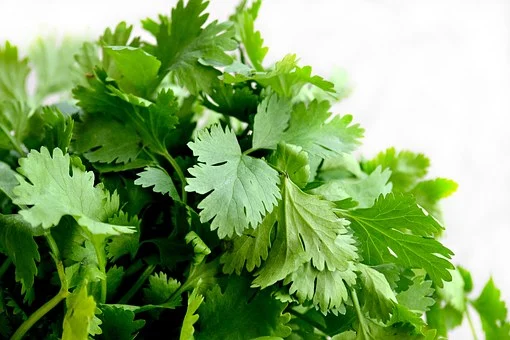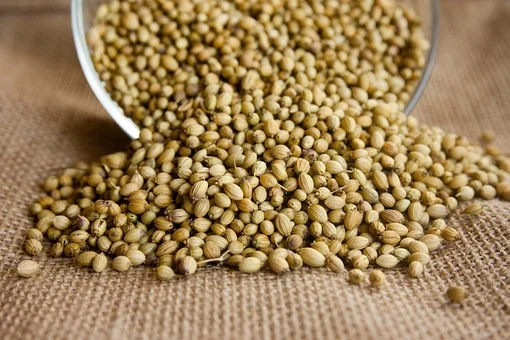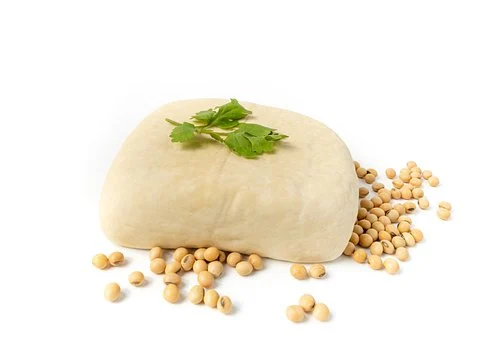Coriander is a herb of the Umbelliferae family. Among spices plants, coriander is a well-known name not only for its unique flavor but also due to its significant health benefits.
From ancient times, coriander is a popular ingredient in our kitchen, But do you know how broad its health benefits are?
Coriander seeds are rich in nutritional, as well as medicinal property, have now been implicated in the treatment of varities of health issue like pain in joints, cold, fever, digestion ease, treatment of intestinal worms, and many others.
Hence it is often referred to as a panacea for various diseases.
Edible parts of coriander
The whole part of the plant is edible, chiefly Seeds and leaves are widely in use. Although, they have a unique taste and medicinal uses.
1. Coriander seeds-
It can be found in whole seed form but is most often sold in powder form.
Seeds has impressive health benefits such as antibacterial, insecticidal, hypoglycaemic, hypolipidemic lipolytic, fungicidal, cytotoxic, stimulant, carminative, antispasmodic, and many more.
coriander seeds could be a potent source of the orally active agent for thyroid preventive therapy
2. Coriander leaves-
Fresh raw leaves are excellent for culinary use for their flavor and taste.
Its leaves are perishable but have comparatively high antioxidants.
Leaves health benefits include diarrhea, mouth ulcer, anemia, menstrual disorder, smallpox, diarrhea, skin disorder, thyroid, swelling, conjunctivitis, and eyecare. As a result, there is a significant demand for coriander leaves.
3. Coriander seeds oil-
Is an essential oil of coriander seeds that constitute terpenes and polyphenols. Nowdays, it is gaining popularity in aromatherapy, digestive aid, and also gives a soothing effect on the skin.
Nutrients Present In Coriander
Coriander possesses many nutritional constituents which are crucial for human consumption.
According to experts, using coriander is no longer confined to dish preparation. In actuality, coriander also has proven health benefits, as it is rich in phytonutrients, low in saturated fat, and a rich reservoir of antioxidants including tocopherol, linoleic acid, essential oil, vitamin K, and micronutrient.
100gm coriander of coriander provide:
- Folates
- Dietary fiber
- Iron
- Water
- Vitamin C
- Carbohydrate
- Protein
- Selenium
- Vitamin B
- Magnesium
- Vitamin A
- Potassium
- Vitamin k
- Sodium
- Vitamin E
How much is good for health (per day/per diet)
Coriander seeds is as an important ingredient of dishes.
The entire plant is edible and is primarily used in the preparation of curries, soups, sauces, garnishing, and chutney.
Studies show that including coriander in diet may reduce varieties of health illnesses.
The advised dosage of coriander is one tablespoon per day.
You can have coriander seeds and leaves, preferably with soup and veggies but for specific health issues, have it with water or tea.

Health benefit of coriander
In addition to flavoring effects, its demand is also increasing in the international market due to its potent constituents, which are beneficial for human consumption.
Generally, coriander plants are cheaper and available throughout the year. All parts of the plant are edible except roots and added for flavoring purposes. Moreover, it has essential oil, that offers both preventive and treatment effects for various illnesses such as:
1. Maintains heart health.
Investigation suggests that coriander potentially decreases fatty acid systematically. Coriander is rich in oleic acid, vitamin C, stearic acid, which are essential for reducing cholesterol levels in the blood.
Some studies show that coriander seeds decrease bad cholesterol. Thus, reducing the deposition of cholesterol in the inner walls of arteries. Furthermore, reducing the chances of blockage.
2. Maintains high blood sugar
One of the chief effects of coriander is on diabetic patients effectively, where a decrease in diabetic level occurs, as it imitates an insulin-like activity.
Regular consumption of coriander can stimulate insulin secretion and enhance glucose uptake effectively. Therefore, it is considered excellent for diabetes.
3. Treats Arthritis
Cineole present in coriander is very effective against the swelling-like condition in the patient suffering from arthritis and rheumatism caused by improper functioning of kidney.
In addition, its some constituent have a direct effect on kidney that does not let the swelling go worse, as it reduces the swelling by removing extra water content.
Aids digestion
Apart from being a digestive stimulant, it is a good appetizer. Regular consumption of coriander in the raw or cooked form helps in the secretion of digestive juice and enzymes, also promotes peristaltic motion. These properties prevent, help and treat the digestive issue.
Citronellol present in coriander is an active antiseptic component, which treats mouth ulcers effectively.
It is also helpful in controlling microbial infection conditions. Thus, effective as a home remedy for diarrhea treatment.
Prevent anemia
The iron and vitamin K content present in coriander shows a positive effect on RBC and WBC leading to an increase in blood count. Therefore, having coriander in diet, either cooked or raw form, enhances blood count naturally.
Possess hormone balancing effect
One of the best properties of coriander is its potent activity towards the endocrine gland, which helps proper secretion of hormones.
Thus, treating menstrual issues such as menses pain, irregular periods, etc. In addition, they stimulate thyroid glands & eventually maintain thyroid levels.
Eye health
Considering coriander nutrional content it is rich in antioxidant, and vitamin C. which are helpful against macular degeneration and maintaining eye health.
furthermore, Coriander also contains antifungal and antiseptic properties which prevent eye infections such as conjunctivitis.
Decreases Microorganism invasion
One of the most profound activities of coriander oil is its insecticidal effect, which is why they are useful against protecting crops.
Moreover, The essential oil shows an inhibitory effect on bacteria, fungi. As they inhibit the growth of microorganism.
Who should avoid coriander?
Coriander is a popular ingredient of traditional medicine. It has a unique aroma which makes it favorable for different food preparation.
However, some people should take care not to eat too much of coriander. Following are the condition where you should avoid taking it in large amount.
- Some people may have an allergic reaction to it.
- low blood pressure patient use it cautiously it may lower blood pressure.
- People with low blood sugar should take it cautiously, as consuming too much of coriander may decrease blood sugar.



